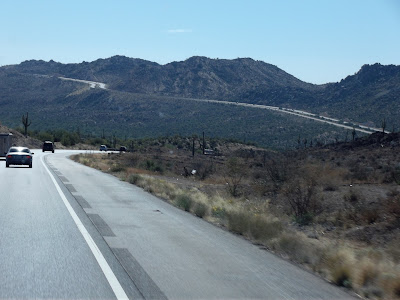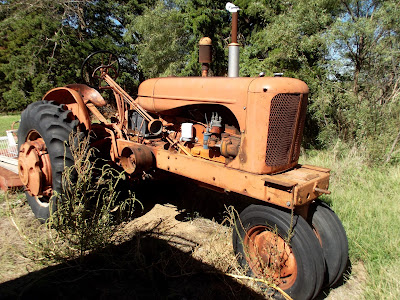I didn’t
catch the sunset at its best this evening, we were coming back from having
dinner in town when I noticed the whole sky was mixed with bright pink and
blue. I ran in when we got home and
grabbed the camera, it was still a beautiful sunset.
This is our
Kansas site (David’s barn lot). We have
everything we need and have been having a wonderful time catching up with David
and the grandkids – lots of things going on.
We were
lucky enough to get to see three of Wyatt’s football games. He is number 33 in this picture. We were hoping we would get to see one of his
basketball games before we had to leave, but that isn’t going to happen. Their first game isn’t until after the first
of November. By that time we will be
back in Mesa putting in our workamper hours at Val Vista Villages.
I went in to
listen to Cheyanne’s piano lesson today.
She is working on a song for a recital in early November. Since we will miss the actual recital I told
her I wanted to hear her play before then.
She said she wasn’t very good with the song yet. I told her it didn’t matter I would love
listening to it anyhow. She said, Of
course you will, you have to, you’re Grandma!”
This is the
view from our site, looking at the city of Pratt in the distance.
Looking to
the east from where we are situated, we can see a mix of old fence posts and
new windmills.
The Kansas
wind can be brutal. This new shed didn’t
stand up to it.
This old
beauty is waiting on David to have time to restore it. It may be sitting a while longer, he’s a busy
guy.
On Monday we
went uptown to visit the Pratt Historical Museum. Looking at the outside you wouldn’t begin to
imagine the treasures it holds inside. I
didn’t remember to take a picture of the outside, it’s just a big plain wooden
building painted white with brown trim and a small sign on the door. You could easily pass it thinking it is
nothing of importance. If you are ever
in or passing through Pratt, KS this is definitely worth the $4 admission
price.
The museum
has been blessed with over one million dollars’ worth of Native American
artifacts from a recently deceased local collector. The artifacts are being shown in a new
display, the Hartman Gallery.
A bone
breastplate was a popular chest ornament of the Plains Indians. The long bones called hair-pipes were made
with bones from buffalo or birds. Since
the hair-pipe bones were difficult to obtain, the number of bones often
indicated the wealth of the warrior. I
think this would have belonged to one of the wealthier warriors.
Naturally,
flash couldn’t be used for pictures so some of them aren’t as bright as I would
like. This Kiowa cradleboard from the
1880’s doesn’t show up nearly as bright in the picture as it really is. The beadwork on this is amazing. The elaborate beadwork followed traditional
tribal designs. A cradleboard could be
carried or hung from a horse saddle horn.
The sharp extensions of these backboards were designed to stick in the
ground in case there was an accident and the baby fell headfirst. This must have been one of the original child
safety standards.
The quality
of the handiwork of this beaded vest and woven basket just leaves me in
awe. I wonder if any of the things I
have made in my lifetime are of the quality needed to last another 100 years or
more – I’m thinking not.
One of the
highlights of this new display is this grizzly bear claw necklace with otter
fur from the mid 1800’s. This necklace
signified the warrior’s high status.
Notice also the hand woven rug on the wall behind this display.
I’ve seen
covered wagons on display in other museums but I’m still amazed at the
adventuresome spirit of the settlers that took off in those wagons in search of
their dreams. We travel in a large motor
coach with all of the modern amenities and we still feel discouraged at times
when things don’t go exactly as we expected them to. Seeing one of these once again makes me very
thankful for all that we have.
As a very
amateur quilter I felt compelled to take a picture of this very detailed quilt
to share with my fellow quilters. I
don’t know the size of this, but it was huge.
One of the
things that is especially appealing to me about this museum is that the things
on display aren’t just laid out for viewing or hung on the wall – they are
displayed as they would have been used by the early prairie settlers. I remember using desks like these wooden ones
in the schoolhouse display.
I loved this
write up about the discussions going on about providing school lunches in 1877. I had lunch with Cheyanne at school today, it
was much better than the hearty soup suggested in this article, but it wasn’t
as good as when we were eating school lunches 60 years ago. That was when some great stuff was made from
scratch by the “cafeteria ladies” – I’m remembering hot rolls and cookies!
This
teacher’s contract from 1896 also caught my eye – I wonder if $30 a month was a
wage they could live on at the time?
The first
thing I noticed in this display was the “eggs in lard” sign. I’m still trying to decide how that
worked. The essential storm shelter for
the prairie home and school was dug into the ground, whitewashed and lined with
stone or cement. It became not only a
place of shelter but also a “prairie refrigerator”.
Wouldn’t the
ladies have looked special on Sunday when they went to church in one of these
lovely hats? Hats were pretty much out
of style by the time I got out of school.
In junior high I did attend a class on how to be a proper lady and
learned when I should wear a hat and white gloves – that knowledge has come in
so handy. I don’t think my current
signature ball cap makes quite the statement these hats would have made.

This adobe
sod house was constructed in the museum with local clay and prairie grass. These houses featured a sod roof. The ceilings were covered, often with sewn
together flour sacks, as the “soddies” tended to let in rain, dirt, debris,
snakes and insects. I get aggravated if
one little fly gets in the house, I obviously don’t have the temperament to be
a prairie settler. The one room adobe
houses were cool in the summer and easy to heat in the winter. The adobe sod furnished a readily available,
cheap building material. But, they were
highly susceptible to damage from the wind and rain so they didn’t last too
many years.
Over 80
years ago a windmill pumped cool clean water to this crock, situated in the
kitchen. When the water reached the
level of the top hole, it would then run down through a channel leading out to
the livestock tank. This gave a
continuous supply of water to the farm.
The Coterie
was organized October 8, 1885, it was the first women’s club in Pratt County,
KS. It remains today as a women’s study
club. For more than a century the ladies
of the club have donated generously to the community. Today they provide college scholarships for
Pratt youth and donate to the public library they helped establish.
The drug
store display is another elaborate display to take you back in time.
The bank
display furnishings were once in the Iuka State Bank, one of the oldest in
Pratt County. The ceiling is pressed
tin, a common building material in early day frame business buildings.
The general
store looks like it could meet most any need.
This dress
is really an eye-catcher. On December
24, 1881 it was a lady’s wedding dress.
She and her husband went on to celebrate their 63rd wedding
anniversary. The dress is made of
brocaded merino wool. Row upon row of
shirring for the skirt is finished by a wide platting as the hem. The dress cost $8.00 to make with the
material and stitching costing $27.00.
Last picture
of this post shows our fall holiday decorations. “Bless This Family” we have
had such a great time the past six months enjoying our amazing kids and
grandkids, we will miss them this winter but we will enjoy the warm weather in
Mesa, AZ.





























































